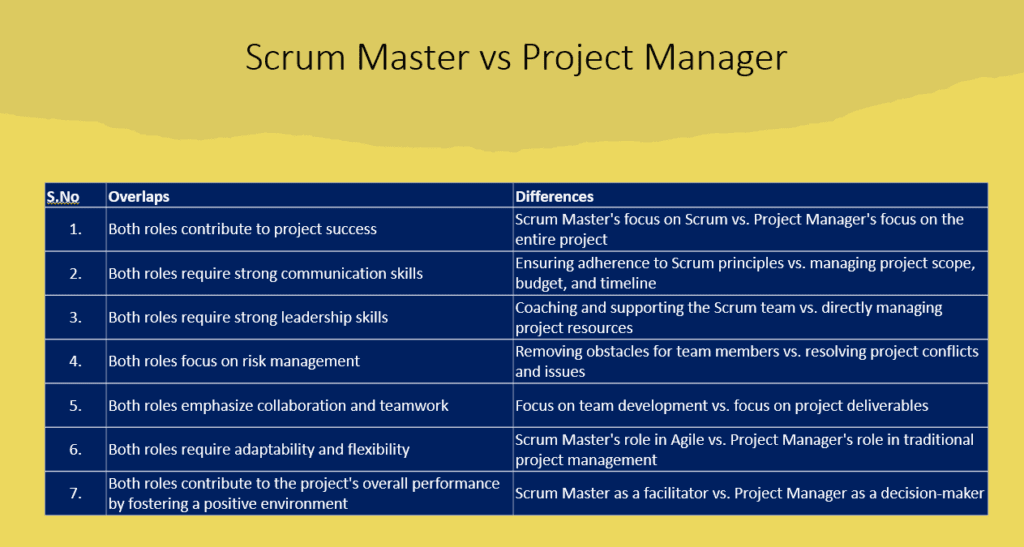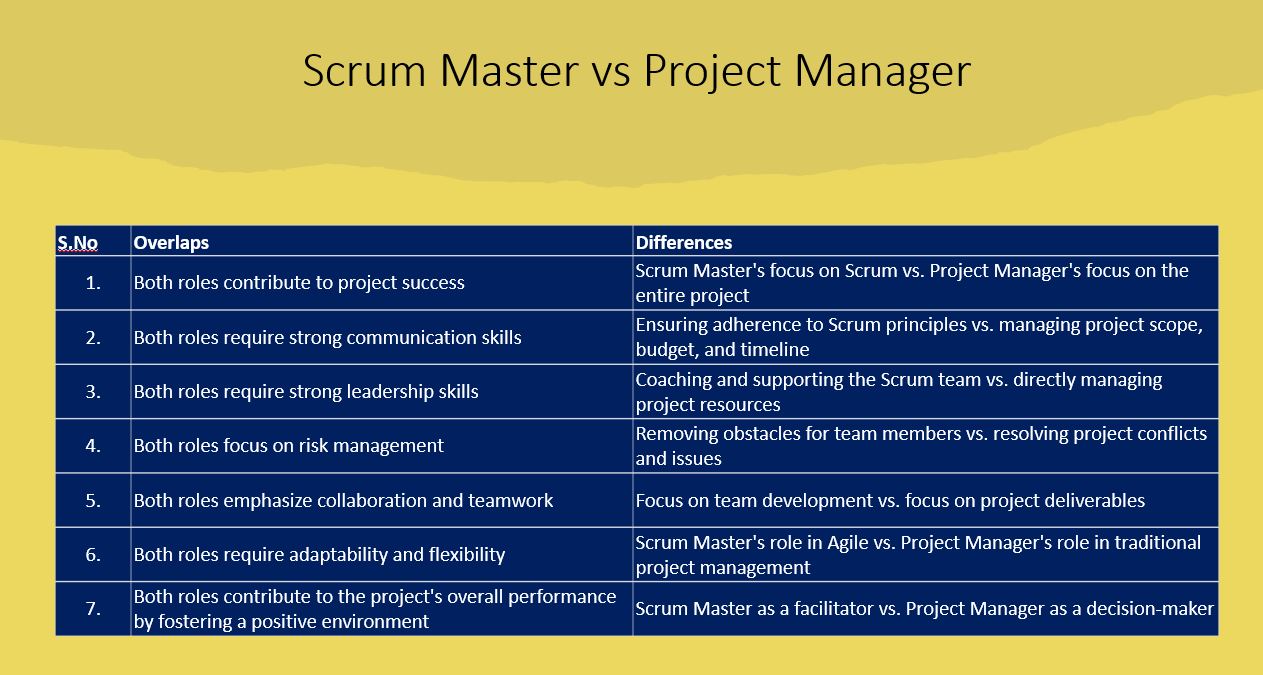How To Guide On Scrum Master vs Project Manager – 7 Key Distinctions & Overlaps
Scrum Master vs Project Manager – Exec Summary

The Agile approach to project management has sparked a debate on the roles of Scrum Masters and Project Managers. Both roles are vital in ensuring project success, yet they have different responsibilities and skillsets.
In this comprehensive guide, we will explore the 7 key distinctions and overlaps between a scrum master role and project manager roles, considering factors such as Scrum principles, project management certifications, and Agile principles.
Scrum Master vs Project Manager – 7 Key Overlaps
Overlap 1: Both prioritize effective communication

Effective communication is the cornerstone of successful project management, and both Scrum Masters and Project Managers recognize its importance. They work to create an environment where team members can openly discuss ideas, issues, and progress.
This includes encouraging team members to share their opinions, actively listening to their concerns, and facilitating discussions to ensure that everyone is on the same page.
Both roles also utilize various communication tools and techniques to ensure that the entire project team is aware of updates and changes. This may involve daily stand-up meetings, regular progress reports, and the use of communication tools like Slack or Microsoft Teams.
By fostering open and transparent communication, both Scrum Masters and Project Managers can help ensure that projects run smoothly and that potential issues are addressed promptly.
Overlap 2: Both strive for continuous improvement
Continuous improvement is an essential aspect of Agile project management, and both Scrum Masters and Project Managers prioritize it. They recognize the importance of regularly assessing their teams’ performance and identifying areas for growth and improvement.
For Scrum Masters, this involves facilitating Scrum events such as Sprint Retrospectives with their scrum teams, where the team reflects on the past sprint and discusses opportunities for improvement. They also coach the team on Scrum practices, helping them to refine their processes and become more efficient.
Project Managers, on the other hand, may use project performance metrics to assess the effectiveness of their project management processes. They may also seek feedback from stakeholders and team members to identify areas for improvement. By focusing on continuous improvement, both roles can help their teams deliver higher-quality products and services.
Overlap 3: Both focus on delivering value to customers
Delivering value to customers is at the heart of Agile project management. Both Scrum Masters and Project Managers work closely with their teams to ensure that the products or services they provide meet or exceed customer expectations.
Scrum Masters facilitate communication between the Product Owner and the development team, helping to ensure that the team understands customer requirements and priorities. They also work with the team to break down complex tasks into manageable chunks, ensuring that the team can deliver incremental value throughout the project.
Project Managers (sometimes also called as agile project manager in an agile environment), on the other hand, are responsible for managing the project scope, budget, and timeline to ensure that the project delivers the desired outcomes. They may also work closely with stakeholders to gather feedback and ensure that the project meets their needs and expectations.
By focusing on delivering value to customers, both roles can help their organizations succeed in today’s competitive business environment.
Overlap 4: Both roles require strong leadership skills

Strong leadership skills are essential for both Scrum Masters and Project Managers. They must be able to motivate and inspire their teams, guiding them toward a common goal. Effective leaders must also be able to adapt to changing circumstances, making decisions quickly and confidently when faced with uncertainty.
Scrum Masters exhibit leadership through their role as servant-leaders, empowering the team to make decisions and solve problems. They also work to create a positive team environment that fosters collaboration and continuous improvement.
Project Managers demonstrate leadership by setting clear expectations, providing guidance and support, and ensuring that the project stays on track. They must be able to make tough decisions, balancing competing priorities and managing stakeholder expectations.
Overlap 5: Both roles focus on risk management
Risk management is a critical aspect of any project, and both Scrum Masters and Project Managers must address potential risks that could impact the project’s success. Identifying and mitigating risks helps to ensure that projects stay on track and deliver the desired outcomes.
Scrum Masters focus on risk management by removing impediments that could hinder the team’s progress. They also work closely with the Product Owner to ensure that the product backlog is well-defined and prioritized, reducing the risk of scope creep or wasted effort.
Project Managers take a more comprehensive approach to risk management, developing risk management plans that address potential issues related to the project’s scope, budget, and timeline. They may also work with stakeholders to identify and address risks related to external factors, such as market conditions or regulatory requirements.
Overlap 6: Both roles emphasize collaboration and teamwork

Collaboration and teamwork are essential for the success of any project, and both Scrum Masters and Project Managers recognize the importance of fostering a collaborative environment. They work to create a culture of open communication, trust, and mutual respect within their teams, encouraging team members to share ideas, solve problems, and work together toward a common goal.
Scrum Masters facilitate collaboration by organizing Scrum events, such as Sprint Planning and Sprint Review meetings, where the team can discuss progress, share ideas, and make decisions together. They also encourage the team to work closely with the Product Owner, ensuring that the development team understands customer priorities and requirements.
Project Managers promote teamwork by ensuring that team members have the necessary resources and support to complete their tasks. They may also facilitate team-building activities or workshops to strengthen team relationships and improve collaboration.
Overlap 7: Both roles require adaptability and flexibility
The dynamic nature of projects often requires Scrum Masters and Project Managers to be adaptable and flexible in their approach. They must be able to adjust their plans and processes in response to changing circumstances, such as new requirements, shifting priorities, or unforeseen challenges.
Scrum Masters demonstrate adaptability by guiding their teams through the iterative Scrum process, encouraging them to learn from each sprint and make adjustments as needed. They also work closely with the Product Owner to ensure that the product backlog remains up-to-date and reflects the most recent customer feedback.
Project Managers exhibit flexibility by adapting their project plans and resource allocations as needed to address changes in scope, budget, or timeline. They may also need to adjust their approach to stakeholder management, communication, or risk management based on the specific needs of the project.
Scrum Master vs Project Manager – 7 Key Distinctions
Difference 1: Focus on the Scrum framework vs. various project management frameworks

One of the most significant differences between Scrum Masters and Project Managers lies in their focus on specific project management frameworks. Scrum Masters are primarily focused on the Scrum framework, ensuring that the Scrum team follows the principles and rules of Scrum. They guide the team in self-organization and continuous improvement, helping them to adopt Agile methodologies.
Project Managers, on the other hand, need to be familiar with various project management frameworks, such as Waterfall, Lean, or Kanban. They may also hold project management certifications, such as the Project Management Professional (PMP) or Agile Certified Practitioner (ACP) from the Project Management Institute. This flexibility allows them to adapt their approach to the specific needs and requirements of the project, ensuring that they can effectively manage projects in a variety of industries and contexts.
Difference 2: Ensuring adherence to Scrum principles vs. managing project scope, budget, and timeline
Another key distinction between Scrum Masters and Project Managers is their focus on specific aspects of project management. Scrum Masters are responsible for ensuring that the Scrum team adheres to Scrum principles and practices. This includes facilitating Scrum events, coaching the team on Scrum processes, and working with the Product Owner to refine the product backlog.
Project Managers, on the other hand, are responsible for managing the project scope, budget, and timeline. This involves defining project objectives, creating detailed project plans, and allocating resources to ensure that the project stays on track.
They may also be responsible for risk management, identifying potential issues that could impact the project’s success and developing strategies to mitigate those risks.
Difference 3: Coaching and supporting the Scrum team vs. directly managing project resources

The approach to team management also differs between Scrum Masters and Project Managers. Scrum Masters act as servant-leaders, empowering their teams to make decisions and solve problems. They foster a positive team environment that encourages open communication and collaboration. They also support the development team by removing obstacles and helping them to continuously improve their skills and processes.
Project Managers have a more directive approach, directly managing project resources and overseeing the work of team members. They are responsible for allocating tasks, monitoring progress, and ensuring that the project stays on schedule.
This may involve managing multiple teams or working with external vendors, depending on the complexity of the project.
Difference 4: Removing obstacles for team members vs. resolving project conflicts and issues
Conflict resolution is an essential aspect of project management, and both Scrum Masters and Project Managers are responsible for addressing conflicts and issues that arise during the project. However, their approaches to conflict resolution may differ.
Scrum Masters focus on removing obstacles that hinder their team’s progress. They facilitate communication and encourage collaboration within the team, taking into account team dynamics and addressing team conflicts. By fostering a positive team environment, Scrum Masters can help to ensure that the team remains focused on delivering value to customers.
Project Managers, on the other hand, are responsible for resolving project conflicts and issues that may arise between team members, stakeholders, or external parties. They may use negotiation, mediation, or decision-making skills to address these conflicts and ensure that the project remains on track.
Difference 5: Focus on team development vs. focus on project deliverables

Scrum Masters primarily focus on developing and supporting the Scrum team, helping them to refine their skills and processes. This includes coaching the team on Scrum practices, facilitating Scrum events, and ensuring that the team remains focused on delivering value to customers.
Project Managers, on the other hand, are more focused on the project deliverables, ensuring that the project stays on track and meets its objectives. They may prioritize tasks and allocate resources based on the project’s needs, ensuring that the project remains on schedule and within budget.
Difference 6: Scrum Master’s role in Agile vs. Project Manager’s role in traditional project management
The Scrum Master’s role is unique to Agile methodologies, specifically the Scrum framework. As such, their primary focus is on guiding the team through the Scrum process, ensuring that they adhere to Scrum principles and practices.
Project Managers, however, can be found in various project management methodologies, including traditional or Waterfall project management. Their role is more versatile and may involve managing projects across a range of industries and contexts. This versatility requires them to have a broader skillset, including expertise in various project management frameworks and the ability to adapt their approach to suit the specific needs of the project.
Difference 7: Scrum Master as a facilitator vs. Project Manager as a decision-maker
The Scrum Master’s primary role is to facilitate the Scrum process, ensuring that the team adheres to Scrum principles and practices. As a servant-leader, the Scrum Master focuses on empowering the team to make decisions and solve problems, providing support and guidance as needed.
On the other hand, the Project Manager often takes on a more decision-making role, overseeing the project’s scope, budget, and timeline. They must be able to make tough decisions, balancing competing priorities and managing stakeholder expectations. This decision-making authority often extends to resource allocation, task prioritization, and conflict resolution.
Wrap Up
By understanding these additional overlaps and differences between Scrum Masters and Project Managers, organizations can better leverage the unique skills and expertise of each role to manage projects effectively. Recognizing the nuances of each role helps organizations to create a strong project management framework that delivers value to customers and stakeholders alike.
If you are into productivity apps , you might be interested in AI writers like CopyAI, Peppertype, Quillbot or Writecream. Read more here. I also write at Medium.





